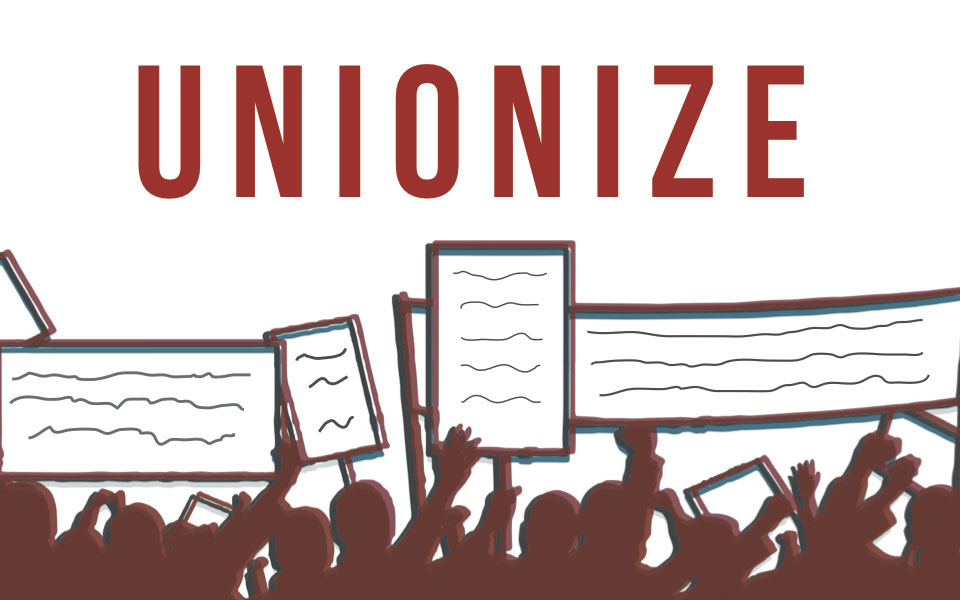Recent weeks have seem heightened tensions between university administration and some faculty as the latter continue to explore unionization despite strong administration admonishment.
As both the face of university administration to the faculty and representation of the faculty to university administration, Provost Isiaah Crawford maintains his official position of opposition to non-tenure track and adjunct faculty’s possible affiliation with Service Employees International Union (SEIU).
As The Spectator noted in last week’s coverage of the unionization battle, Crawford “jarred” several faculty members by sending out a pair of strongly-worded messages to faculty that discouraged them from engaging with union representatives and suggested they do more research on the issue before moving forward.
“We believe our existing collaborative process of shared governance is a far better approach,” Crawford said, restating his outlook of preservation.
Crawford believes the current system provides “a culture that fosters collegiate engagement and dialogue.” He said the presence of “third party representation… would bring an end to the… direct communication contingent faculty now have with program directors, department chairs, deans and the provost’s office” and disrupt the “sense of community we enjoy.”
That said, Crawford noted that he is conscious of and responsive to the frustrations shared by non-tenured faculty.
Since joining Seattle U as Provost in 2008, Crawford said that he has been in collaboration with the Academic Assembly (AcA), working to “enhance the professional development and job satisfaction” of Seattle U faculty.
The AcA, a faculty-elected committee, has thus far chosen to remain officially neutral on the potential unionization of their non-tenured colleagues and continue to urge administration leadership to mirror this neutrality.
The outcomes of Crawford’s planning with the AcA are likely to include salary increases for full-time, non-tenured faculty.
Crawford provided an item-by-item plan to The Spectator delineating the steps that the administration has taken since his arrival to improve conditions for faculty, including several measures designed to affect non-tenured faculty.
For one, Crawford has secured an additional $5.6 million that he says “ensures” a minimum annual salary of $42,000 for full-time, non-tenured faculty without a terminal degree and additional $3,000 for those with one.
Crawford admitted that some of Seattle U’s full-time, non-tenure faculty previously earned “less than $25,000 in some areas of the university.”
One anonymous faculty member we spoke to would likely adjust Crawford’s low-end estimate, citing his own 2012 gross salary of only $16,000.
With his planned raises, Crawford is attempting to “bring salaries to competitive levels with our peers.” These raises are, according to Crawford, included in the budget proposals for 2015 and 2016.
Addressing some of the loudest cries from disgruntled non-tenure and adjunct faculty seeking to unionize, Crawford reminds critics that he has additionally taken significant steps to enhance the employment security of full-time, non-tenure faculty since arriving at Seattle U. Prior to 2008, continuing faculty were informed that they had indeed been rehired “just before the start of the fall term,” according to Crawford. Now they are alerted in April if they will be returning for the following academic year.
For adjunct faculty who continue to cite their being left in the dark as to the future of their employment as a major factor behind the unionization exploration, these efforts have clearly not proven satisfactory.
The adjustments being made to the employment of part-time adjunct faculty by Crawford and his “shared governance body” are much less clear. The plan he provided notes that the 2015 fiscal budget will include a request to raise the salary for part-time faculty, but this raise is unspecified and is not elaborated upon.
When reflecting on his efforts to address non-tenure employment dissatisfaction, Crawford said the situation has “improved dramatically since I got here in 2008… The voice of the faculty is much stronger to what it has been.”
Crawford wants to ensure that there is no misunderstanding in his position: “the Provost is not anti-union… We have unions at the university and we’re very comfortable with that,” but a “two-tiered system,” such as a union, communicating between a university and its faculty creates “tension.”
Crawford took a markedly more lax tone when he said that “contingent faculty will ultimately make the decision about whether to support SEIU or not.” He went on to say that they “have a right to consider it.”
As reform measures and union exploration continue, Rob Rutherford, president of the AcA spoke to the question of who has the most say in the future of Seattle U’s faculty and administration dialogue. According to him, students hold the balance of power at Seattle U and will play a role in whatever is to come.
“Students are the most important constituency on campus,” said Rutherford. “They are why they are here.”





